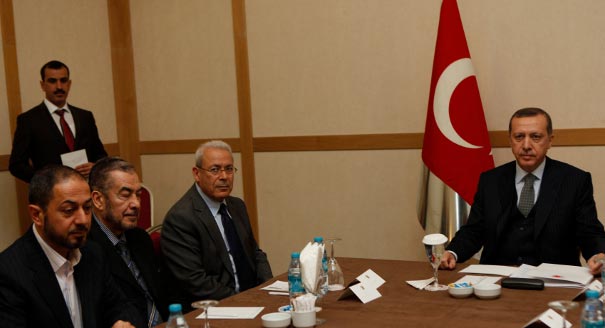Turkey’s Relations with the Syrian Opposition
A few years ago, when Turkey truly believed that it could pursue a policy of “zero problems with neighbors,” Syria was one of its success stories. How quickly times can change. Now Turkey has turned toward the Syrian opposition trying to push President Bashar al-Assad out of power. But that relationship too is fraught.
In the 1980s and 1990s, the two countries had poor relations. The Syrian regime extended massive support to the Kurdistan Workers’ Party (PKK), the Kurdish organization determined to gain independence for Turkish Kurds by force. Events came to a head in 1998 when Turkey massed troops on its border with Syria to force the regime to end its support for the PKK.
Soon thereafter relations between the two countries started improving. In a little over a decade, Syria had become a partner for Turkey: cross-border trade and investment flourished and a new visa-free policy allowed citizens of both countries to move at will across the border—weekend shopping expeditions by Syrians into Turkey were common. The two governments even experimented with holding joint cabinet meetings.
Then the Arab Spring intervened, Turkey embraced change, the region became increasingly divided, and Ankara discovered that it could not be a friend to everybody. It had to make choices. In this new calculus, Syria shifted from being a close partner to a highly problematic neighbor whose regime Turkey could no longer tolerate, let alone befriend.
Turning to the Opposition
Turkey is bound by geography and history to play a role in the unfolding Syrian drama. When the Syrian uprising began, Turkey still considered Syria a friend, and in that capacity it sought to put pressure on the regime of Bashar al-Assad to introduce a program of reform. Assad stonewalled Turkey’s pressure and that of all other countries that sought to bring about a peaceful end to the crisis.
In response, Turkey became increasingly critical of the Assad regime. The change became very clear in August 2011, when the Turkish foreign minister, Ahmet Davutoglu, visited Damascus and the Syrian government yet again categorically refused to respond to the revolt by adopting a real plan of dialogue and reform. Turkey became an enemy of the Assad regime and a supporter of the Syrian opposition.
On March 26, 2012, Turkey closed down its embassy in Damascus, and on April 1 it hosted the second meeting of the “Friends of Syria,” the coalition of Arab and Western countries set up to provide some support for the Syrian opposition and ease Bashar al-Assad out of power. The rupture with the regime is now complete, but what do Turkey’s evolving relations with the Syrian opposition signify in concrete terms?
Ankara has developed a special relationship with the Syrian National Council (SNC), the major civilian coalition based in exile seeking the overthrow of Assad, but the extent of its relations with the opposition’s armed wing, the Free Syrian Army, is less clear. The Free Syrian Army’s senior commanders are based in Turkey, but their movement is limited and they complain privately that they receive no arms, equipment, training, or operational assistance such as intelligence.
Turkey’s approach to the Syrian opposition needs to be seen in the context of wider questions. Are these new ties strong enough to enable Turkey to contribute to constructing a new Syria that does not jeopardize Ankara’s regional political and economic interests? Or is the opposition too divided—with rivalry among coalitions inside and outside the country and distrust between the Muslim Brotherhood and its secular partners within the Syrian National Council—to allow Turkey to be an effective agent of transformation in Syria and protect its own interests adequately? The presence of the Kurdish minority in Syria is particularly vexing for Turkey, which is still struggling with its own unresolved Kurdish problem.
Turkey’s Cautious Approach
At the height of Turkey and Syria’s stormy relationship between 1984 and 1998, the Syrian opposition was coordinating its activities from European capitals. Europe offered the opposition better conditions for conducting its struggle first against Hafez al-Assad and then against his son Bashar. The European base also provided the opposition with greater visibility in the international arena.
At the same time, the Islamist opposition, led by the Muslim Brotherhood, was mostly coordinated from Arab countries like Saudi Arabia, where some of its top leaders had taken refuge. True, Syrians hostile to the Damascus had long been settled in Turkey, but their role had never been determinant in the activities of the opposition to the Baathist regime. The improvement of relations between Turkey and Syria, which started in 1998 and accelerated after Recep Tayyip Erdogan became prime minister in November 2002, made the development of a Syrian opposition in Turkey even more unlikely.
As a result, when the uprising against the Assad regime started in March 2011, the secular elements of the Syrian opposition in exile started organizing from Europe, and particularly Paris, although they also maintained a presence in Doha and Istanbul. Leading members of what was to become the Syrian National Council, including its president, Burhan Ghalioun, had long been based in Paris.
Turkey, however, had geography on its side, and soon after the uprising began, it became the main staging ground for the opposition in exile. Some leading members of the Syrian Muslim Brotherhood who had already moved to Turkey, including its deputy general guide Mohammed Tayfour, were now joined by other members of the Syrian National Council’s executive office. Since April 2011, the Turkish authorities have discreetly helped the Syrian National Council to organize, allowing it to convene its first congresses in Antalya in April and a second meeting in Istanbul in July 2011.
Prime Minister Erdogan’s initial hopes that he could convince Assad to avoid violence and undertake structural political reforms, including the introduction of a multiparty system and the inclusion of the opposition in the country’s political life, were soon dashed. Following the failure of the last-ditch attempt by Erdogan and Davutoglu in mid-August 2011, Ankara turned decisively against Assad, joining international efforts to stop the Syrian regime and openly backing both the Syrian National Council and the Free Syrian Army.
Nevertheless, Ankara’s position remained cautious, particularly concerning the armed opposition. It allowed human rights organizations such as Mazlumder and IHH, formally independent but in reality very close to the Erdogan government, to help the Syrian opposition hold meetings and more broadly coordinate its activities. Turkey’s policy toward the Free Syrian Army was more ambivalent, however. Ankara accepted the presence of defectors from the Syrian military but provided them with limited support, fearful of encouraging a protracted war.
Turkey’s hesitant policy is manifest in its position concerning the opening of humanitarian corridors into Syria to deliver assistance to the civilian population. The opening of such corridors was first suggested by the French foreign minister, Alain Juppé, and Erdogan repeatedly endorsed it, particularly when especially vicious attacks by the Syrian army against civilians caused a new influx of refugees into Turkey, for example on March 22. Most recently, Erdogan raised the issue during an official visit to China on April 9.
In practice, Turkey has not taken concrete steps, because officials know that opening humanitarian corridors would require the commitment of a military force capable of standing up to Syrian armed resistance. Turkey is not willing to face a conflict with Syria alone, and other countries are unwilling to participate, despite calls to action from Saudi Arabia and Qatar.



